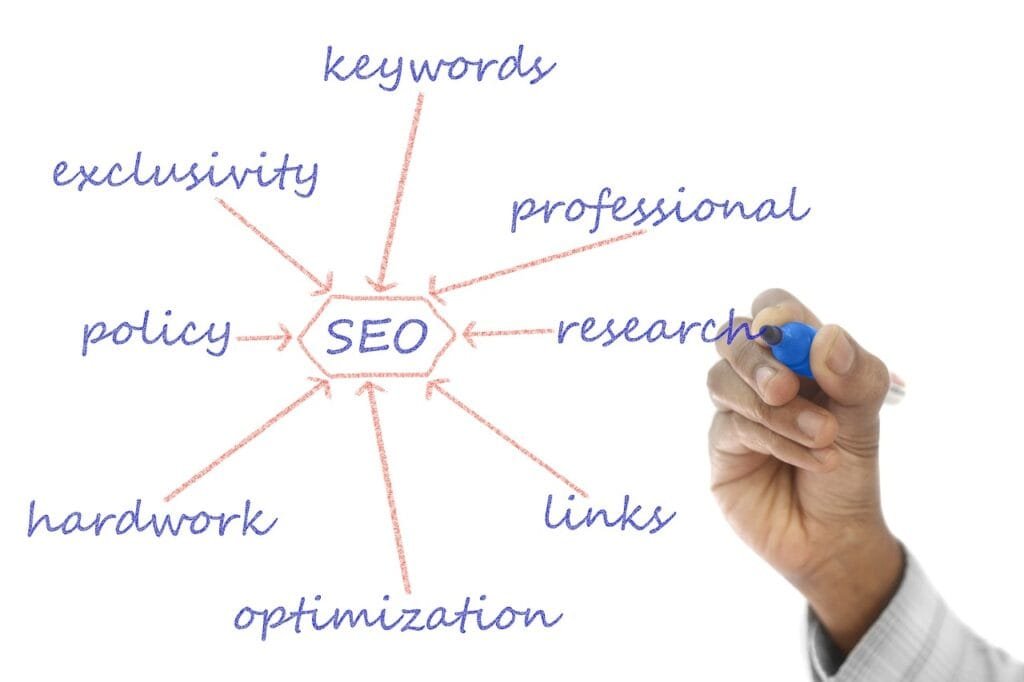This Article has been revised, edited and added to, by Poulomi Chakraborty.
- Chapter 1: Understanding the SEO Landscape
- On-Page Optimization
- Quality Content
- Link Building
- Technical SEO
- The Role of Emerging SEO Trends in Startup Growth
- The Impact of SEO on Branding and Authority
- Harnessing the Power of Data Analytics in SEO
- Integrating SEO with Other Marketing Channels
- Navigating SEO Compliance and Regulations
- Cultivating a Robust SEO Foundation
- Chapter 2: Tailoring an Effective SEO Budget
- Assessing Your Financial Health
- Defining SEO Goals
- Cost Estimations
- Prioritization
- Monitoring and Adjustments
- Risk Management
- A Case for Professional Help
- Establishing a Dynamic Budget Allocation Model
- Incorporating Competitive Analysis into Budget Planning
- Leveraging Scalability in SEO Investments
- Predictive Budgeting for Future SEO Needs
- Allocating Resources for SEO Experimentation
- Crafting a Proactive SEO Budget
- Chapter 3: Maximizing ROI on Your SEO Budget
- Cultivating a Data-Driven Culture
- Focus on Content
- User Experience (UX) Optimization
- Agile Adaptation
- Relationship Building
- Testing and Optimization
- The Organic-Paid Partnership
- Monitoring and Reporting
- Optimizing the Allocation of SEO Resources
- Integrating SEO with Business Analytics
- Advanced Tracking and Measurement Techniques
- Strategic Content Leveraging
- Fostering Synergies with Other Marketing Initiatives
- Sustaining Long-term SEO Value
- Chapter 4: Actionable Takeaways and Final Thoughts
- Actionable Steps for Effective SEO Budgeting
- Comprehensive Market Analysis
- Integration of SEO with Overall Business Strategy
- Leveraging Technology for SEO Optimization
- Building a Flexible SEO Roadmap
- Fostering a Culture of Continuous Learning
- Strategic Partnerships and Collaborations
- Prioritizing User Experience in SEO
- A Strategic Approach to SEO Budgeting
- Final Thoughts: A Journey of Growth and Evolution
In the bustling digital market, standing out is more than a necessity—it’s a prerequisite for survival. As a startup, every ounce of visibility counts, turning the spotlight on an often-underestimated ally: Search Engine Optimization (SEO). While the art and science of SEO are comprehensive and dynamic, it’s the fiscal blueprint backing it that holds the keys to the kingdom of online prominence. This article unravels the intricate tapestry of weaving SEO into the very fabric of a startup’s financial planning, illuminating the pathway to scalable, sustainable business growth.
SEO is not just a technical term; it’s a vibrant ecosystem. It breathes life into your online presence, ensuring your business isn’t just visible but vividly so, painting a compelling picture for your audience. Yet, like any masterpiece, it demands investment—of time, effort, and yes, finances. But, how do you as a startup allocate funds to SEO amidst a myriad of other pressing needs? Welcome to the world of SEO budgeting—a journey where every penny spent is a step towards not just visibility, but viability and vitality in the market.
A well-planned SEO budget is akin to a lighthouse, guiding your startup safely to the shores of business growth, ensuring you’re noticed, remembered, and preferred amidst the tumultuous waves of the competitive digital landscape. As we delve deeper into this narrative, we’ll explore the intrinsic connection between strategic SEO spending and exponential business expansion, providing insights, tips, and strategies to turn every dollar into a stepping stone for unprecedented success.
We are about to navigate through the waters of understanding SEO costs, demystifying the elements that demand your financial attention, and offering a roadmap to allocate resources effectively. From on-page optimization to content creation, link building to analytics, every aspect is a piece of the puzzle, fitting seamlessly into your broader business strategy. Embark on this journey to unravel how a meticulously crafted SEO budget isn’t an expense but an investment into a future where your startup doesn’t just survive but thrives, blossoming into a force of influence, innovation, and inspiration.
Chapter 1: Understanding the SEO Landscape

Navigating the vast expanse of the SEO landscape can be akin to exploring an enigmatic forest. Each tree, from keyword optimization and quality content to backlinks and site architecture, plays a pivotal role in your startup’s online visibility. These elements are interwoven, and mastering them is essential, yet the mastery comes at a cost. How much should a startup budget for this? Herein lies the conundrum.
In this chapter, we unpack the diverse elements of SEO and translate them into tangible financial commitments. Each SEO facet is an investment opportunity that, when strategically approached, can yield dividends in the form of increased visibility, traffic, and ultimately, revenue.
On-Page Optimization
On-page optimization is the bedrock of SEO, encompassing elements within your website that can be tweaked and tuned to resonate with search engine algorithms. This includes keyword placement, meta tags, URL structures, and the quality of content. But these refinements require a blend of expertise and resources. Hiring a skilled SEO specialist or investing in training existing staff, procuring tools for keyword research, and optimizing website design are initial costs that startups must anticipate.
Quality Content
Content is king in the digital realm. It’s the language through which brands speak to audiences, weaving narratives that resonate, inform, and persuade. But quality content comes at a price. Budgeting for skilled content creators, editors, and strategists is vital. Every blog post, video, infographic, and social media update is an asset, an investment towards building a repository of value that draws audiences in and keeps them engaged.
Link Building
Backlinks are the currency of credibility in the online world. They signal to search engines that your content is not just valuable but endorsed by others. However, cultivating a rich garden of quality backlinks isn’t incidental. It demands a strategy, outreach, and often, financial investment in content that’s link-worthy.
Technical SEO
Beneath the visible layer of a website lies the intricate world of technical SEO. Site speed, mobile optimization, and secure connections are critical yet often overlooked aspects of SEO. These demand investment in quality hosting, website design, and security certificates.
The Role of Emerging SEO Trends in Startup Growth
In the rapidly changing digital environment, staying abreast of emerging SEO trends is crucial for startups aiming to outpace their competitors. Understanding and leveraging advancements such as voice search optimization, artificial intelligence in search algorithms, and the importance of local SEO can provide startups with a competitive edge.
For instance, optimizing for voice search involves understanding natural language processing and ensuring your content can be easily interpreted by voice-activated devices. This not only caters to the growing number of voice search users but also positions your startup as a forward-thinking, tech-savvy enterprise.
The Impact of SEO on Branding and Authority
SEO’s role extends beyond driving traffic—it’s a powerful tool for building brand authority and establishing a trustworthy online presence. Effective use of SEO strategies, such as crafting authoritative content and gaining high-quality backlinks, helps a startup become recognized as a leader in its niche.
This recognition significantly boosts consumer confidence and can influence purchasing decisions, thereby enhancing the overall brand value and extending its reach in the marketplace.
Harnessing the Power of Data Analytics in SEO
Data analytics forms the backbone of successful SEO strategies. By thoroughly analyzing data such as keyword performance, user engagement metrics, and competitor SEO tactics, startups can make informed decisions that refine their SEO approaches.
Advanced tools and platforms offer insights into what strategies are working and which ones are not, allowing startups to optimize their SEO efforts for maximum effectiveness. Emphasizing a data-driven approach ensures that SEO strategies are not based on intuition alone but are supported by empirical evidence and real-world metrics.
Integrating SEO with Other Marketing Channels
For startups, an integrated marketing approach can enhance the effectiveness of SEO efforts. Coordinating SEO with social media, email marketing, and paid advertising campaigns can create a cohesive online presence that amplifies reach and increases impact.
For example, using SEO insights to inform social media content can improve engagement on both platforms. Additionally, aligning email marketing campaigns with SEO-driven content strategies can increase traffic to optimized landing pages, thereby enhancing overall marketing ROI.
Navigating SEO Compliance and Regulations
As search engines evolve, so do the regulations and guidelines that govern SEO practices. Startups must ensure compliance with these evolving standards to avoid penalties that could harm their visibility and credibility.
Keeping up-to-date with Google’s algorithm updates and adapting SEO strategies accordingly is vital for maintaining search rankings and visibility. This includes understanding new privacy laws and data protection regulations that affect how startups collect and utilize SEO data.
Cultivating a Robust SEO Foundation
For startups, understanding and implementing a robust SEO strategy is more than a marketing tactic; it is a fundamental aspect of sustainable business growth. By deepening their knowledge of the SEO landscape through ongoing education, adapting to new trends and technologies, and integrating SEO with broader marketing activities, startups can enhance their market position.
Moreover, focusing on compliance and leveraging data analytics will ensure that their SEO efforts are both effective and efficient. Ultimately, a well-rounded understanding of SEO provides startups with the tools needed to navigate the complexities of the digital marketplace, driving both visibility and viability.

Related: Check out our free SEO suite

Chapter 2: Tailoring an Effective SEO Budget
Creating an effective SEO budget requires more than just allocating funds. It involves a deep understanding of both your startup’s financial landscape and the dynamic world of SEO. This chapter aims to bridge the gap between these two realms, offering a pathway to create an SEO budget that’s as robust as it is flexible, ensuring every dollar spent is a strategic step towards tangible growth.
Assessing Your Financial Health
The first step to effective SEO budgeting is assessing your startup’s financial health. This involves a meticulous analysis of your income, expenses, and projected financial growth. Understanding your financial boundaries is crucial. It provides a framework within which your SEO budget must fit, ensuring that your investment in SEO is sustainable and proportional.
Defining SEO Goals
Your SEO goals are the compass that guides your budgeting journey. Are you aiming for increased visibility, higher traffic, or direct conversions? Each goal comes with its own set of strategies and expenses. Aligning your SEO goals with your business objectives ensures that your investment translates into measurable business growth.
Cost Estimations
With goals defined, estimating costs becomes the next pivotal step. This involves a detailed analysis of the potential expenses associated with each SEO strategy. From content creation and on-page optimization to link building and technical SEO enhancements, each element comes with a price tag.
Prioritization
Every startup operates within financial constraints. Prioritizing SEO elements becomes essential to ensure the most impactful strategies receive the necessary funding. This is a dynamic process, as priorities may shift based on the evolving business landscape, market trends, and algorithm updates.
Monitoring and Adjustments
An SEO budget isn’t set in stone. It’s a living entity that should evolve with your startup’s growth and the SEO landscape’s dynamism. Regular monitoring and adjustments ensure that your budget remains aligned with your goals, responsive to opportunities and challenges alike.
Risk Management
The volatile nature of SEO necessitates a focus on risk management. Allocating a portion of the budget to address unforeseen challenges and opportunities ensures that your startup remains agile, able to pivot and adapt to the ever-changing digital terrain.
A Case for Professional Help
Given the complexity and dynamism of SEO, many startups opt for professional help. SEO agencies and consultants can provide tailored strategies, expertise, and tools to navigate the SEO journey. Budgeting for professional help is an investment in expertise and efficiency, propelling your startup towards its SEO goals with precision and speed.
Establishing a Dynamic Budget Allocation Model
In the realm of startup SEO, adopting a dynamic budget allocation model can significantly enhance the ability to respond to market and performance changes swiftly. This model involves setting up a flexible budget that allows for reallocation of resources based on ongoing analysis and results.
For example, if certain SEO tactics such as content development or technical improvements are yielding higher returns than expected, additional funds can be directed towards these areas to maximize impact. Conversely, underperforming strategies can be scaled back or refined, ensuring that the SEO budget is always optimized for the best possible outcomes.
Incorporating Competitive Analysis into Budget Planning

Understanding the competitive landscape is essential for tailoring an SEO budget that can compete effectively in crowded markets. Conducting a thorough competitive analysis to identify what competitors are spending on SEO, the tactics they are employing, and the effectiveness of these tactics can provide valuable insights.
This information helps startups not only to benchmark their SEO spending but also to identify gaps in competitors’ strategies that they can exploit. Leveraging this knowledge ensures that the SEO budget is not just adequate but strategically targeted to carve out a competitive edge.
Leveraging Scalability in SEO Investments
Startups should consider scalability when planning their SEO budget. Initially, it may be beneficial to invest in scalable SEO practices that do not require proportional increases in spending to grow. For instance, once a solid content strategy is in place, the cost of producing additional content may decrease over time while still generating increasing returns.
Similarly, investing in scalable SEO tools that can handle growing amounts of data and expanding keyword lists without significant additional costs can ensure long-term sustainability of the SEO strategy.
Predictive Budgeting for Future SEO Needs
Anticipating future SEO needs and incorporating them into the current budget can save costs and streamline future expansions. This predictive budgeting approach takes into account the anticipated growth of the startup and plans for SEO needs that will arise as the business scales.
For example, as the startup grows, there may be a need to enhance the website’s infrastructure to maintain optimal site speed and accommodate more traffic. Planning for these expenses in advance can prevent costly last-minute upgrades and ensure a smoother scaling process.
Allocating Resources for SEO Experimentation
To stay ahead of the curve in SEO, startups must allocate part of their budget to experimentation and innovation. This could involve testing new SEO tools, exploring emerging SEO technologies like voice search optimization, or experimenting with different content formats to see what resonates most with audiences.
Although not all experiments will yield positive results, the insights gained from these endeavors are invaluable and can lead to breakthrough strategies that significantly boost SEO effectiveness.
Crafting a Proactive SEO Budget
Crafting an effective SEO budget for a startup is not just about allocating funds but strategically investing in areas that will offer the greatest return on investment. By adopting a dynamic budgeting model, incorporating competitive insights, focusing on scalability, predicting future needs, and allowing for experimentation, startups can ensure their SEO budget is both robust and responsive.
This proactive approach to SEO budgeting ensures that the startup not only keeps pace with the evolving digital landscape but also thrives, driving sustainable business growth through strategic SEO investments.
Chapter 3: Maximizing ROI on Your SEO Budget

Embarking on the SEO journey is akin to stepping into a garden where each dollar planted can blossom into visibility, engagement, and revenue. However, to ensure every seed sown yields a bountiful harvest, startups must not only invest but invest wisely. In this chapter, we unfurl the roadmap to maximizing the ROI on your SEO budget, turning each expenditure into an opportunity for exponential growth.
Cultivating a Data-Driven Culture
In the world of SEO, data isn’t just king—it’s the kingdom. A data-driven culture ensures each decision is grounded in insights, each strategy fine-tuned to resonate with market dynamics. Investing in analytics tools and expertise is an investment in clarity, precision, and efficiency.
Focus on Content
Quality content is the heartbeat of SEO. Every article, blog post, and social media update is an opportunity to engage, inform, and persuade. However, creating content that resonates requires a blend of creativity and strategy. Allocate resources to not just content creation but content optimization, ensuring each piece is aligned with SEO best practices.
User Experience (UX) Optimization
SEO and UX are inseparable twins. A website that’s optimized for search engines but not for users is like a garden that’s visible but not inviting. Invest in enhancing the user experience, ensuring your website is not just found but is also engaging, intuitive, and user-friendly.
Agile Adaptation
The SEO landscape is as dynamic as the seasons. Algorithms change, market trends evolve, and consumer preferences shift. An agile adaptation strategy ensures your startup can pivot, adapt, and evolve. Allocate a portion of your budget to ongoing learning, strategy refinement, and tactical shifts to stay ahead of the curve.
Relationship Building
SEO isn’t a solitary journey. It’s a communal expedition where relationships can be the bridge to visibility and credibility. Invest in building relationships with influencers, bloggers, and industry leaders. Every collaboration, guest post, and partnership is a seed sown in the garden of online prominence.
Testing and Optimization
In the SEO garden, not all plants will flourish equally. A/B testing and ongoing optimization ensure that resources are directed towards strategies that yield the most bountiful harvest. Allocate resources to testing, learning, and optimizing, turning each insight into an opportunity for growth.
The Organic-Paid Partnership
While the focus is often on organic SEO, paid strategies can be the catalyst for growth. A budget that balances both organic and paid strategies ensures your startup enjoys both immediate visibility and long-term growth.
Monitoring and Reporting
In the world of SEO, what isn’t measured can’t be managed. A portion of the budget should be allocated to monitoring and reporting tools. These provide insights into the performance of your SEO strategies, offering opportunities for refinement and optimization.
Optimizing the Allocation of SEO Resources
In the quest to maximize the ROI of an SEO budget, understanding where to allocate resources most effectively is paramount. This involves not only choosing the right strategies but also continuously optimizing the distribution of budget across various SEO activities.
For startups, this might mean prioritizing areas that directly impact revenue generation, such as conversion rate optimization and keyword targeting for high-intent search terms. Investing in these areas can produce more immediate financial returns, while also setting a foundation for sustained growth.
Integrating SEO with Business Analytics
To truly maximize SEO ROI, it is crucial to integrate SEO efforts with broader business analytics. This integration allows for a deeper understanding of how SEO impacts not only web traffic but also other key business metrics like customer acquisition costs, lifetime value, and sales conversions.
By linking SEO performance with these metrics, startups can refine their SEO strategies based on their direct contribution to business success, ensuring that every dollar spent on SEO is accountable and aligned with overall business goals.
Advanced Tracking and Measurement Techniques
Employing advanced tracking and measurement techniques is essential for accurately assessing the effectiveness of SEO strategies. This goes beyond basic analytics to include the use of sophisticated attribution models that can trace the precise impact of SEO activities on sales and other important actions.
Techniques like multi-channel funnel analysis can reveal how SEO efforts interact with other marketing activities, providing a holistic view of how different channels contribute to and amplify each other’s success.
Strategic Content Leveraging
Maximizing ROI also involves leveraging content strategically across multiple platforms and formats. This approach ensures that investments in content creation yield multiple benefits. For example, a well-researched blog post can be repurposed into a video, a podcast episode, several social media posts, and even a downloadable PDF guide. This not only extends the reach of the original investment but also caters to different audience preferences, maximizing the engagement and impact of each piece of content.
Fostering Synergies with Other Marketing Initiatives
Creating synergies between SEO and other marketing initiatives can significantly enhance ROI. For instance, aligning SEO strategies with public relations efforts can increase the reach and impact of media mentions and press releases, while integrating SEO with pay-per-click (PPC) campaigns can ensure consistency in messaging and keyword targeting, improving the effectiveness of both channels. By harmonizing SEO with overall marketing activities, startups can create a more cohesive and powerful marketing engine.
Sustaining Long-term SEO Value
Ultimately, maximizing ROI on an SEO budget is about much more than short-term gains; it involves setting up strategies that will continue to deliver value over the long term. This requires a balance of immediate optimizations and investments in long-term growth areas like brand building and audience engagement.
By adopting a comprehensive and integrated approach to SEO budgeting and strategy development, startups can ensure that their SEO efforts contribute robustly to their ongoing business success, driving both immediate returns and sustainable growth.
Chapter 4: Actionable Takeaways and Final Thoughts

In this culminating chapter, we distill the essence of the preceding narrative into actionable takeaways. Every insight, strategy, and case study is woven into a tapestry of steps that startups can embark upon immediately, turning the theoretical framework of SEO budgeting into a tangible pathway for business growth and scalability.
Actionable Steps for Effective SEO Budgeting
1. Clarity of Vision:
Begin with clear SEO goals. Align these with your overall business objectives. Clarity of vision ensures that every dollar invested in SEO is a step towards holistic business growth.
2. Financial Analysis:
Conduct a detailed analysis of your startup’s financial health. Understanding your financial boundaries ensures that your SEO budget is realistic, sustainable, and aligned with your fiscal capabilities.
3. Strategy Customization:
Customize your SEO strategies. Every business is unique; tailoring your SEO approach ensures it resonates with your specific market, audience, and business landscape.
4. Data Utilization:
Embrace a data-driven culture. Invest in analytics tools and expertise to ensure that every SEO decision is grounded in insights, optimizing the ROI on every dollar spent.
5. Content Focus:
Prioritize quality content. Content is the bridge that connects businesses with audiences; ensure it’s a focal point of your SEO budget.
6. Adaptability:
Be prepared to adapt. The SEO landscape is dynamic; an adaptable budget ensures your startup can pivot in response to evolving trends and algorithm changes.
7. Monitoring & Optimization:
Invest in ongoing monitoring and optimization. SEO is a journey, not a destination; continuous refinement ensures your strategies remain optimal.
8. Professional Collaboration:
Consider collaborating with SEO professionals. Their expertise can enhance efficiency, precision, and ROI.
Comprehensive Market Analysis
Before diving deep into the minutiae of SEO budgeting, a thorough market analysis stands as a cornerstone of strategic planning. Understanding the competitive landscape, identifying niche markets, and analyzing competitor strategies are fundamental to setting realistic and impactful SEO goals. Startups should invest in advanced analytics tools and expert consultations to map out the market dynamics. This broader perspective will aid in fine-tuning SEO investments to outmaneuver competitors and capture key market segments effectively.
Integration of SEO with Overall Business Strategy
SEO should not exist in isolation but rather be integrated seamlessly with the startup’s overall business strategy. This integration involves aligning SEO goals with business objectives such as brand awareness, market entry, customer engagement, and product launches.
By synchronizing SEO activities with product development cycles and marketing campaigns, startups can ensure that every dollar spent on SEO directly supports broader business outcomes, enhancing the coherence and impact of both marketing and product strategies.
Leveraging Technology for SEO Optimization

In the age of digital transformation, leveraging cutting-edge technology to optimize SEO efforts is non-negotiable. Artificial intelligence and machine learning can be harnessed to analyze user behavior, predict market trends, and automate routine SEO tasks such as keyword research and content personalization. Investing in technology not only streamlines operations but also provides deeper insights into customer preferences and behavior, enabling startups to make data-driven decisions that refine SEO strategies continuously.
Building a Flexible SEO Roadmap
Flexibility in SEO planning allows startups to adapt to unexpected market changes and algorithm updates quickly. A dynamic SEO roadmap that includes short-term wins and long-term goals will enable startups to pivot their strategies in response to real-time analytics and feedback. This adaptability can be the difference between staying ahead of the curve and falling behind in the rapidly evolving digital landscape.
Fostering a Culture of Continuous Learning
SEO is an ever-evolving field, with search engines regularly updating algorithms and best practices. Creating a culture of continuous learning and professional development within the startup can empower teams to stay updated with the latest SEO trends and techniques. Regular training sessions, workshops, and subscriptions to leading SEO resources are investments that build the team’s capabilities and ensure the startup remains at the forefront of SEO innovation.
Strategic Partnerships and Collaborations
Forming strategic partnerships with other companies and influencers in the industry can significantly enhance a startup’s SEO efforts. Collaborations with content creators, tech providers, and industry thought leaders can lead to shared content, backlink opportunities, and increased brand visibility. These partnerships not only boost SEO results but also expand the startup’s network and credibility within the industry.
Prioritizing User Experience in SEO
While technical SEO aspects like keywords and backlinks are crucial, the ultimate goal of SEO should be to enhance the user experience. This includes optimizing website navigation, improving page speeds, and ensuring content is engaging and valuable to the audience. A focus on user experience not only improves search rankings but also increases customer satisfaction and loyalty, driving higher conversion rates and long-term business growth.
A Strategic Approach to SEO Budgeting
As startups look to capitalize on the vast opportunities presented by effective SEO budgeting, embracing a strategic, integrated, and flexible approach will be key. The ability to not only set but dynamically adjust an SEO strategy in alignment with both market conditions and internal business goals will define the successful navigation of the digital marketing landscape.
Armed with advanced analytics, innovative technologies, and a robust understanding of market dynamics, startups can craft an SEO budget that drives not just traffic but real, sustainable growth. Remember, in the intricate dance of digital marketing, every strategic move and budget allocation should aim to enhance visibility, drive engagement, and foster business growth, ensuring that each step taken is as impactful as it is insightful.
Final Thoughts: A Journey of Growth and Evolution
SEO budgeting is more than a fiscal exercise; it’s a strategic expedition that intertwines with the very essence of startup growth. Every dollar allocated to SEO is an investment in visibility, engagement, and conversion. It’s a seed sown in the fertile grounds of the digital landscape, with the potential to blossom into sustainable, scalable business growth.
Yet, every journey is unique. As we conclude this narrative, remember that the insights and strategies illuminated are starting points. Your startup’s SEO budgeting journey will be as unique as your vision, innovation, and market. It will evolve, adapt, and transform, echoing the dynamic dance of the digital landscape.
In this dance, every step, pivot, and turn is an opportunity for growth. SEO budgeting isn’t a static entity but a dynamic ally, evolving with your startup’s journey, market trends, and algorithm shifts. It’s a lighthouse that illuminates the pathway to business growth, ensuring every step taken in the digital landscape is strategic, informed, and optimal.
As you step into the world, armed with insights and strategies, remember that SEO budgeting is both a science and an art. It’s a narrative where numbers meet narratives, analytics meet creativity, and investment meets innovation. In this intricate dance, every dollar spent is a narrative woven into the tapestry of online visibility, audience engagement, and business growth.
Read Next:




















